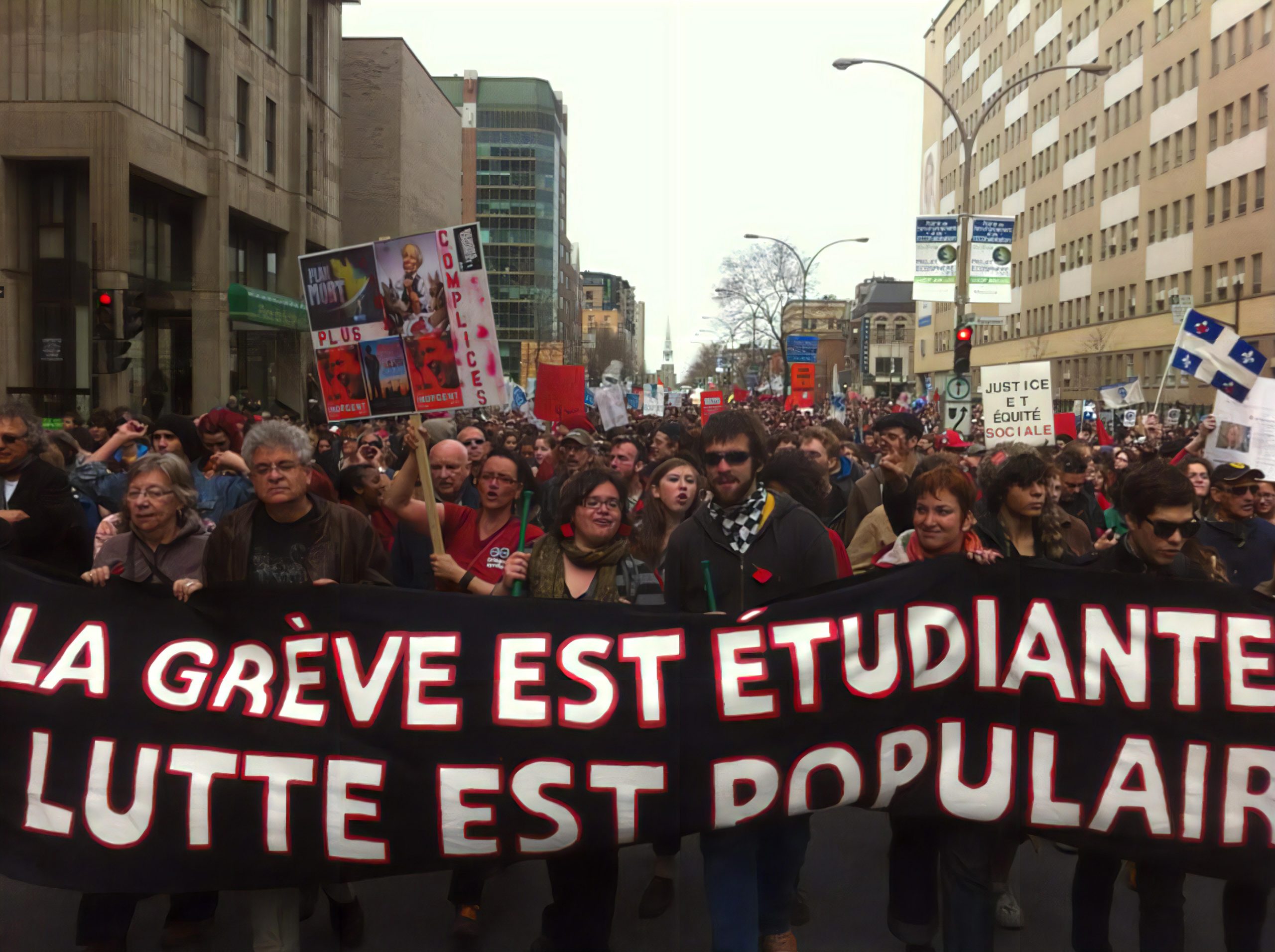
STUDENT STRIKES
There is a long history of student strikes in Quebec, with the focus primarily on cost of education, the loans and grants system and educational opportunities. The first recorded strike occurred in 1958 with a one day stoppage to abolish student fees and increase the accessibility of higher education. Major strikes have taken place in 1968, 1974, 198, 1986, 1988, 1990, 1996, 2005, and 2012.1
Strikes are a way for disempowered individuals to stand up to those in positions of power with the benefits of their combined power. Strikes are effective because people withhold their labour from those occupying positions of power who rely on said labour. When large numbers of students go on strike the government must make the choice between negotiating or extending/canceling the semester, the cost of which is prohibitively high and result in large logistical issues. The economy would face massive skilled labour shortages and universities would have to accommodate a much higher number of students (new students coming in without students graduating). Strikes are also effective as they force responses from politicians and the media by generating a province-wide discussion of issues affecting students.2
Recent Strikes at McGill
2012 – The 2012 student strike over tuition fee increases was the longest student strike in Canadian history lasting nearly seven months. The strike drew close to 310,000 students across Quebec and was extensively covered by the media. This strike ended with the adoption of Bill 78 which forced students back to class and limited their right to protest (this bill was met with international condemnation and was repealed soon after).1 A number of measures were also adopted by McGill to dissuade strikers, including keeping exam locations secret, denying academic accommodations to strikers, and establishing a procedure Regarding Demonstrations, Protests and Occupations on McGill University Campuses.3 McGill faculty associations voted on the strike, with the majority of faculties voting for a limited or unlimited strike, except the Arts Undergraduate Society (AUS), which voted against striking. Despite AUS’s vote not to strike, many departmental associations within AUS voted to strike.4 Overall, the strike was successful in temporarily prolonging the tuition freeze as well as in spurring public discussion about accessibility to education, teaching quality and the role of universities in Quebec’s development.1
2015 – The Law Students’ Association (LSA) voted to hold a one-day strike against austerity measures (Primarily cuts to public services including education and healthcare) in conjunction with universities province-wide.5
2018 – In partnership with social work programs at UQAM and Université de Montréal as well as CEGEPs across the province, McGill’s Social Work Student Association (SWSA) went on strike for a week in November and again in March to protest mandatory unpaid internships. The Social Work faculty attempted to support students by canceling classes during the strike period but this was prohibited by McGill administration.6 As a result of these strikes and long term advocacy against unpaid internships the Quebec government introduced a scholarship for education, health and social services students in their final mandatory unpaid internship. The strikes demands to improve the conditions of internships and that interns be protected under the Act respecting Labour Standards were ignored however.7
2019 – Following successful petitioning from students (primarily by Climate-Justice Action McGill activists), the Arts Undergraduate Society of McGill (AUS) voted to hold a one-day strike in an effort to pressure the university and government to meet the demands of the climate strike movement and to participate in the global mobilization for climate justice. Despite AUS not enforcing the strike mandate it had voted for, a major walkout took place both inside and outside the Arts Faculty.8
2020 – McGill Education Undergraduate Students in partnership with other education faculties at UQAM voted to strike for two days in opposition to Bill 21 which banned the wearing of religious symbols by teachers and other public service employees. The strike and associated protests called for the repealing of the bill and urged McGill to use their political sway to strongly oppose the bill.9
2021 – McGill’s Social Work Student Association (SWSA), Education Graduate Students’s Society (EGSS), and Law Students’ Association (LSA) all voted to strike from in-person classes in order to demand online and flexible options for students uncomfortable returning to in-person classes. These associations stated that since many of their members were in field placements with vulnerable populations that they wished for options that protected both their members and those they worked with. The strike lasted several months for some departments and led to increased flexibility in their departments’ return to campus planning.10
Note: Many strikes in McGill’s history are short, one-day strikes known as symbolic strikes. Symbolic strikes are a way of publicly protesting something and drawing media attention, rather than directly exercising power against those in power. While they may be effective in garnering some media attention they rarely result in the larger changes and discussions associated with longer strikes.11
Information for Students Considering Striking
The power of the strike is in student solidarity, it is important to ensure that students are passionate about the issue at the heart of the strike. Encourage every striker to take part in an aspect of the strike (picketing, contacting the media, event organizing, research, etc.) to prevent isolation and demoralization. Additionally all strikers should be informed and consulted at all stages of the strike through options such as General Assemblies and regular listservs.
Additionally the strength of a strike can differ depending on whether it is enforced or not. Strike-breaking occurs when despite a vote to strike, members continue to attend classes/go to work. Enforcing the strike means that there are deterrents to strike-breaking such as having to cross a picket line to enter class, social pressure, and disruptions to classes. Not enforcing a strike may prevent divisions amongst students but has the possibility of reducing the collective power of the strike and placing those who do strike at greater risk of reprisals.12
Strikes are meant to be representative of the beliefs of the members, therefore a general assembly and successful vote are required before a strike can be initiated. At SSMU a Strike General Assembly can be called by requesting so by a resolution from legislative council or a written petition from at least 50 members of SSMU from at least 4 different faculties (for more details see section 13.2 of SSMU’s Constitution). Once at the General Assembly quorum for a resolution to put the Society on strike shall be 500 members of the Society. If the General Assembly approves a strike it is expected that all members regardless of their personal opinions will abide by the decision out of respect for the democratic procedure. Strikes can also be organized at the faculty or department level, and their constitutions should be consulted for details on calling a general assembly. This route should be prioritized as it is easier to pass a strike vote and enforce a strike on several smaller levels rather than university-wide.
Before a General Assembly is organized strike councils should meet to draft a plan for the strike that will be presented at the Assembly. This plan should include the reason for the strike, past attempts to negotiate on/resolve the issue, the kind of strike being proposed (general, targetted, unlimited, week-long, etc.), plans for enforcement of the strike, as well as ways to engage members throughout the strike (events, picketing, social media campaigns, etc.). Additionally, the council may want to campaign before the strike (this can be combined with gathering petition signatures) to improve the likelihood of achieving a strike vote, and the quorum needed to make it official. A strike council should also be organized after a successful vote to strike as mobilization is needed to be able to enforce such a decision.
A frequent tactic of universities to disempower student strikes is to allege that strikes are limited to workers under the Labour Code and therefore student strikes should be considered simple boycotts. In reality strikes have existed long before the existence of the Labour Code and have been elevated to a fundamental right by the International Covenant on Economic, Social, and Cultural Rights. The idea that student strikes are a boycott comes from the false idea that students are mere clients obtaining a service from the university whereas in reality students are intellectual workers who contribute to the university.13
It is important to distinguish between strikes and walkouts. Walkouts can be planned or spontaneous and consist of a sudden stoppage of work as people leave their buildings/classes as a sign of protests. Strikes however require a general assembly vote in advance often following failed negotiations with those in power. Strikes also tend to last longer than walkouts which are typically only one-day occurrences. Walkouts can be beneficial for gaining media attention about an issue, but similar to one-day strikes they lack the bargaining power associated with a longer strike.12
Students often worry about the consequences of missed classes. Typically after a strike ends the university will determine the amount of classes to be made up and the semester’s schedule may be condensed or extended to accommodate.12
The right to strike is enshrined in the Canadian Charter of Rights and Freedoms, the Charter of human rights and freedoms, and the International Covenant on Economic, Social and Cultural Rights, dating from 1966, which was ratified by Canada. This pressure tactic operationalizes the right to freedom of association and freedom of expression. Public demonstrations can be an important part of strikes, however considerations must be made to lessen the possibility of legal consequences and/or police violence. In doing so, it is all the more important to recognize that some face greater risk as a result of historic and ongoing systems of oppression and marginalization. Detailed guides on demonstrations and interacting with the police can be found here (EN), here (FR), and here (FR).
As noted above McGill also has procedures Regarding Demonstrations, Protests and Occupations on McGill University Campuses. This procedure is used by the university to determine whether interventions are needed in the case of demonstrations and how the university intends to respond to certain situations. The procedure does not allow for demonstrations that inhibit university business (e.g., blocking access to buildings) or pose risk to the safety and security of both people and university property. The procedure is noticeably vague and therefore allows for a variety of interpretations. If you are interested in advocating for changes to these procedures please email external@ssmu.ca so we can support you.
Works Cited
- Lambert, M. (2014). 2012 Québec Student Strike | The Canadian Encyclopedia. Thecanadianencyclopedia.ca. Retrieved 14 August 2022, from https://www.thecanadianencyclopedia.ca/en/article/quebec-student-protest-of-2012.
- Pedneault, J. (2012). Student Strike FAQ. Students’ Society of McGill University. Retrieved 14 August 2022, from https://ssmu.ca/blog/2012/03/student-strike-faq/.
- McGill Reporter. (2012). Tuition protest drags on, few incidents at McGill. Retrieved 14 August 2022, from https://reporter.mcgill.ca/tuition-protest-drags-on-few-incidents-at-mcgill/.
- The McGill Daily. (2012). AUS strike vote fails. Retrieved 14 August 2022, from https://www.mcgilldaily.com/2012/03/aus-strike-vote-fails/.
- Bachelder, J., & Sadikov, I. (2015). McGill Women’s Studies, Law students vote to strike. The Mcgill Daily. Retrieved 14 August 2022, from https://www.mcgilldaily.com/2015/04/mcgill-womens-studies-law-students-vote-to-strike/
- Black, E. (2019). Unpaid Interns Strike. The Mcgill Daily. Retrieved 14 August 2022, from https://www.mcgilldaily.com/2019/03/unpaid-interns-strike/.
- Yao, J. (2018). Social work students strike against unpaid internships. The Mcgill Tribune. Retrieved 14 August 2022, from https://www.mcgilltribune.com/news/social-work-students-strike-against-unpaid-internships-112018/.
- Askey, M. (2019). AUS Legislative Assembly discusses climate strike vote. The Mcgill Tribune. Retrieved 15 August 2022, from https://www.mcgilltribune.com/news/aus-legislative-assembly-discusses-moving-strike-climate-march-sept-27-092419/.
- Malhotra, T. (2020). McGill Students Strike Against Bill 21. The Bull & Bear. Retrieved 14 August 2022, from https://bullandbearmcgill.com/mcgill-students-strike-in-outpour-against-bill-21/.
- Kahn, G. (2022). McGill social work students choose strike over return to in-person classes. CBC. Retrieved 14 August 2022, from https://www.cbc.ca/news/canada/montreal/mcgill-social-work-1.6320311.
- Labour Notes. (2019). Ways to Strike. Labor Notes. Retrieved 15 August 2022, from https://www.labornotes.org/2019/10/ways-strike.
- Strikes vs. Walkouts. Schoolnutrition.org. (2018). Retrieved 14 August 2022, from https://schoolnutrition.org/news-publications/sn-magazine/bwc/2018/september/strikes-vs-walkouts/.
- Association des juristes progressistes. (2012). The student strike is not a simple boycott: history and perspectives | AJP. Ajpquebec.org. Retrieved 14 August 2022, from http://www.ajpquebec.org/the-student-strike-is-not-a-simple-boycott-history-and-perspectives/.
